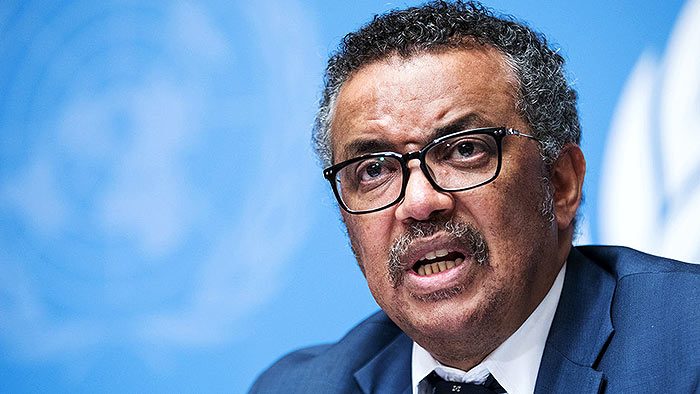Calling Omicron ‘mild’ a mistake, warns World Health Organization

The Omicron variant of COVID-19 is killing people across the globe and should not be dismissed as mild, the World Health Organization insisted Thursday.
WHO chief Tedros Adhanom Ghebreyesus said the record numbers of people catching the new variant — which is rapidly out-competing the previously-dominant Delta variant in many countries — meant hospitals were being overwhelmed.
“While Omicron does appear to be less severe compared to Delta, especially in those vaccinated, it does not mean it should be categorised as mild,” Tedros told a press conference.
“Just like previous variants, Omicron is hospitalising people and it is killing people,” he explained.
“In fact, the tsunami of cases is so huge and quick, that it is overwhelming health systems around the world.”
Just under 9.5 million new COVID-19 cases were reported to the WHO last week — a record, up 71 percent on the week before.
But even this was an underestimate, Tedros said, as it did not reflect the backlog of testing around the Christmas-New Year holidays, positive self-tests not registered, and overburdened surveillance systems missing cases.
Vaccination targets slipping away
Tedros used his first speech of 2022 to slam the way rich nations hogged available vaccine doses last year, saying it had created the perfect breeding ground for the emergence of virus variants.
He therefore urged the world to share out vaccine doses more fairly in 2022, to end the “death and destruction” of COVID-19.
Tedros wanted every country to have 10 percent of their population vaccinated by the end of September 2021 and 40 percent by the end of December.
Ninety-two of the WHO’s 194 member states missed the target set for the end of 2021 — indeed 36 of them had not even jabbed the first 10 percent, largely due to being unable to access doses.
Tedros wants 70 percent jabbed in every country by mid-2022.
On the current pace of vaccine roll-out, 109 countries will miss that target.
“Vaccine inequity is a killer of people and jobs and it undermines a global economic recovery,” said Tedros.
“Booster after booster in a small number of countries will not end a pandemic while billions remain completely unprotected.”
Omicron not the end
The WHO’s COVID-19 technical lead Maria Van Kerkhove said it was “very unlikely” that Omicron would be the last variant of concern before the pandemic is over.
In facing the more transmissible Omicron variant, Van Kerkhove urged people to step up the measures they were already taking to protect themselves against the virus.
“Do everything that we have been advising better, more comprehensively, more purposefully,” she said.
“We need people to hang in there and really fight.”
Van Kerkhove added that she was stunned by how sloppily some people were wearing facemasks.
“It needs to cover your nose and mouth… wearing a mask below your chin is useless,” she said.
Looking ahead to this year, Bruce Aylward, the WHO’s frontman on accessing coronavirus tools, added that there was “no need to finish 2022 in a pandemic”.
But WHO emergencies director Michael Ryan said that without vaccine equity, “we will be sitting here at the end of 2022 having somewhat the same conversation, which, in itself, would be a great tragedy”.
(Source: AFP)

Latest Headlines in Sri Lanka
- Military deserter arrested for sexually assaulting doctor at Anuradhapura Hospital March 12, 2025
- Tuition teacher under investigation for student assault ignores NCPA summons March 12, 2025
- Sri Lanka maintains stance on Adani, open to investment March 12, 2025
- Doctors strike over delay in arrest of sexual assault suspect March 12, 2025
- Sri Lanka to introduce freelancer registration system for banking and financial benefits March 11, 2025


